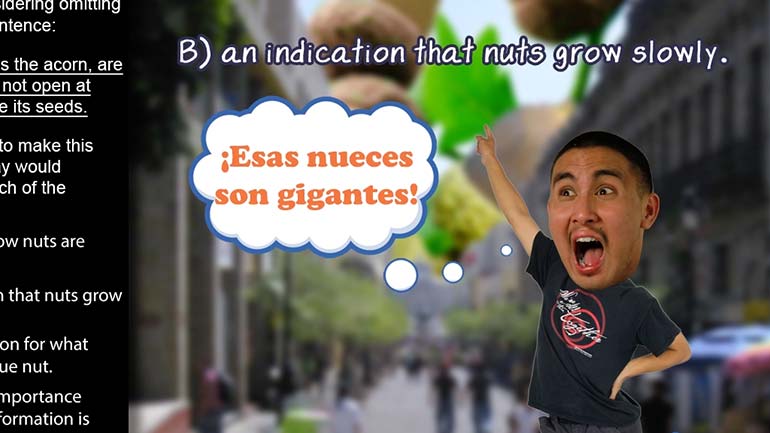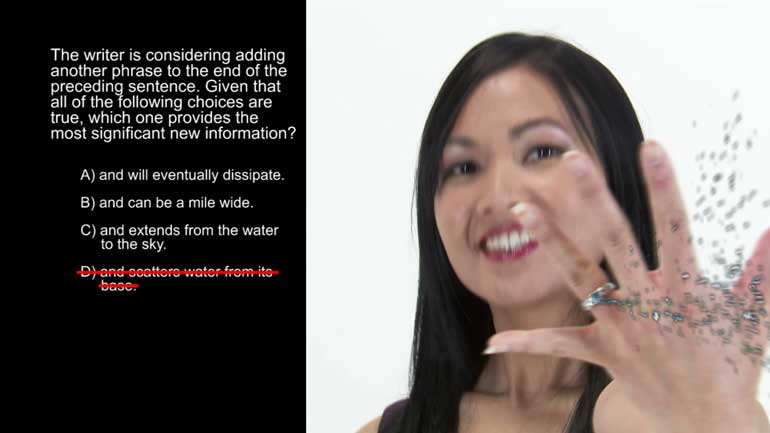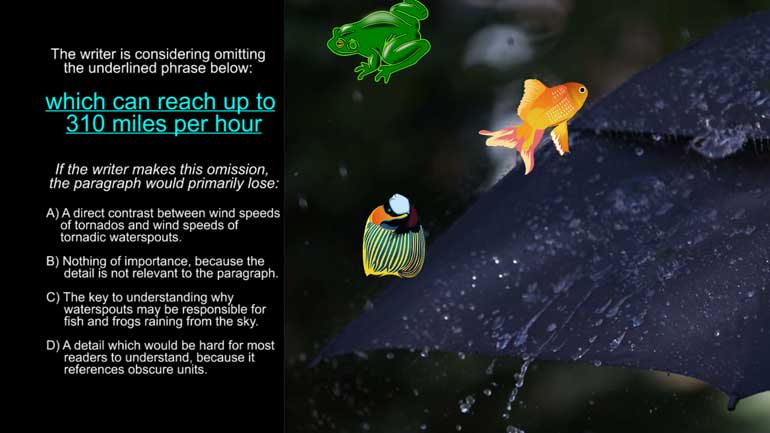ShmoopTube
Where Monty Python meets your 10th grade teacher.
Search Thousands of Shmoop Videos
Relative Value of Evidence Videos 5 videos
ACT English: Passage Drill Drill 1, Problem 14. Checking for redundant or irrelevant information.
ACT English: Passage Drill Drill 3, Problem 9. Which choice provides the most significant new information?
ACT English: Passage Drill Drill 3, Problem 2. What would the paragraph lose if the writer omits the underlined phrase?
ACT English 5.11 Passage Drill 243 Views
Share It!
Description:
ACT English: Passage Drill 5, Problem 11. If the writer made the change described, what would the essay primarily lose?
Transcript
- 00:04
Here's your Shmoop du jour, brought to you by nearsighted spiders. Wow, imagine what
- 00:08
the optometrist bill would be like for a creature with eight eyes.
- 00:23
The writer is considering replacing the underlined phrase...
- 00:26
often have poor eyesight and weave using only their sense of touch
- 00:31
with...
Full Transcript
- 00:33
do not see well
- 00:34
If the writer made this change, the essay would primarily lose what?
- 00:39
And here are the potential answers...
- 00:45
This question requires us to not only take a close look at the underlined portion, but
- 00:49
to also have a good idea of the information contained in the passage as a whole.
- 00:53
Thinking caps will be required. Luckily ours just got back from the dry cleaners.
- 00:58
Answer (A) claims that the writer would lose info about the many strands of thread that
- 01:02
go into the weaving of spiders' complex webs.
- 01:09
This is wrong on two levels...
- 01:10
1) the underlined portion says nothing about the makeup of spider webs
- 01:13
and...
- 01:14
2) this info is thoroughly covered earlier in the passage
- 01:18
(B) tells us that this substitution will eliminate confusion by cutting out a new term that's not explained.
- 01:24
Unless one considers "poor eyesight" a confusing concept, this is also incorrect.
- 01:30
The underlined segment doesn't throw anything too mind blowing at us, so we can nix choice (B).
- 01:36
Choice (D) says the article will no longer contain a comparison between spiders and other insects.
- 01:41
However, the underlined portion says absolutely nothing about other insects; its focus is
- 01:46
solely on spiders.
- 01:47
(Which can be unhealthy if taken too far...)
- 01:50
In any case, (D) is off the list. The correct answer is (C).
- 01:54
The main difference between the current phrase, "often have poor eyesight and weave using
- 01:58
only their sense of touch," and the new one, "do not see well," is that the first phrase
- 02:04
spells out the reason why the poor eyesight is relevant—spiders can't even see the complicated
- 02:10
webs they create.
- 02:13
The rumor is that a spider bit a witch many, many years ago, and ever since, spiders have
- 02:16
been cursed with the inability to see their own webs.
Related Videos
ACT English: Punctuation Drill 2, Problem 2. Where should the semi-colon be placed?
ACT English: Punctuation Drill 3, Problem 1. How should this sentence be changed so that it is grammatically correct?
ACT English: Punctuation Drill 3, Problem 2. How should we properly hyphenate the words in this sentence?
ACT English: Punctuation Drill 3, Problem 4. Which choice best formats this list of items?
ACT English: Punctuation Drill 2, Problem 1. Which choice of punctuation best completes the sentence?









